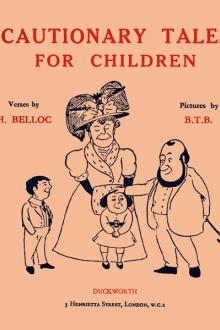Wieland; Or, The Transformation: An American Tale, Charles Brockden Brown [reading diary .txt] 📗

- Author: Charles Brockden Brown
Book online «Wieland; Or, The Transformation: An American Tale, Charles Brockden Brown [reading diary .txt] 📗». Author Charles Brockden Brown
"He has since been summoned to the bar. The audience was composed of thousands whom rumours of this wonderful event had attracted from the greatest distance. A long and impartial examination was made, and the prisoner was called upon for his defence. In compliance with this call he delivered an ample relation of his motives and actions." There he stopped.
I besought him to say who this criminal was, and what the instigations that compelled him. My uncle was silent. I urged this inquiry with new force. I reverted to my own knowledge, and sought in this some basis to conjecture. I ran over the scanty catalogue of the men whom I knew; I lighted on no one who was qualified for ministering to malice like this. Again I resorted to importunity. Had I ever seen the criminal? Was it sheer cruelty, or diabolical revenge that produced this overthrow?
He surveyed me, for a considerable time, and listened to my interrogations in silence. At length he spoke: "Clara, I have known thee by report, and in some degree by observation. Thou art a being of no vulgar sort. Thy friends have hitherto treated thee as a child. They meant well, but, perhaps, they were unacquainted with thy strength. I assure myself that nothing will surpass thy fortitude.
"Thou art anxious to know the destroyer of thy family, his actions, and his motives. Shall I call him to thy presence, and permit him to confess before thee? Shall I make him the narrator of his own tale?"
I started on my feet, and looked round me with fearful glances, as if the murderer was close at hand. "What do you mean?" said I; "put an end, I beseech you, to this suspence."
"Be not alarmed; you will never more behold the face of this criminal, unless he be gifted with supernatural strength, and sever like threads the constraint of links and bolts. I have said that the assassin was arraigned at the bar, and that the trial ended with a summons from the judge to confess or to vindicate his actions. A reply was immediately made with significance of gesture, and a tranquil majesty, which denoted less of humanity than godhead. Judges, advocates and auditors were panic-struck and breathless with attention. One of the hearers faithfully recorded the speech. There it is," continued he, putting a roll of papers in my hand, "you may read it at your leisure."
With these words my uncle left me alone. My curiosity refused me a moment's delay. I opened the papers, and read as follows.
Chapter XIX
"Theodore Wieland, the prisoner at the bar, was now called upon for his defence. He looked around him for some time in silence, and with a mild countenance. At length he spoke:
"It is strange; I am known to my judges and my auditors. Who is there present a stranger to the character of Wieland? who knows him not as an husband—as a father—as a friend? yet here am I arraigned as criminal. I am charged with diabolical malice; I am accused of the murder of my wife and my children!
"It is true, they were slain by me; they all perished by my hand. The task of vindication is ignoble. What is it that I am called to vindicate? and before whom?
"You know that they are dead, and that they were killed by me. What more would you have? Would you extort from me a statement of my motives? Have you failed to discover them already? You charge me with malice; but your eyes are not shut; your reason is still vigorous; your memory has not forsaken you. You know whom it is that you thus charge. The habits of his life are known to you; his treatment of his wife and his offspring is known to you; the soundness of his integrity, and the unchangeableness of his principles, are familiar to your apprehension; yet you persist in this charge! You lead me hither manacled as a felon; you deem me worthy of a vile and tormenting death!
"Who are they whom I have devoted to death? My wife—the little ones, that drew their being from me—that creature who, as she surpassed them in excellence, claimed a larger affection than those whom natural affinities bound to my heart. Think ye that malice could have urged me to this deed? Hide your audacious fronts from the scrutiny of heaven. Take refuge in some cavern unvisited by human eyes. Ye may deplore your wickedness or folly, but ye cannot expiate it.
"Think not that I speak for your sakes. Hug to your hearts this detestable infatuation. Deem me still a murderer, and drag me to untimely death. I make not an effort to dispel your illusion: I utter not a word to cure you of your sanguinary folly: but there are probably some in this assembly who have come from far: for their sakes, whose distance has disabled them from knowing me, I will tell what I have done, and why.
"It is needless to say that God is the object of my supreme passion. I have cherished, in his presence, a single and upright heart. I have thirsted for the knowledge of his will. I have burnt with ardour to approve my faith and my obedience.
"My days have been spent in searching for the revelation of that will; but my days have been mournful, because my search failed. I solicited direction: I turned on every side where glimmerings of light could be discovered. I have not been wholly uninformed; but my knowledge has always stopped short of certainty. Dissatisfaction has insinuated itself into all my thoughts. My purposes have been pure; my wishes indefatigable; but not till lately were these purposes thoroughly accomplished, and these wishes fully gratified.
"I thank thee, my father, for thy bounty; that thou didst not ask a less sacrifice than this; that thou placedst me in a condition to testify my submission to thy will! What have I withheld which it was thy pleasure to exact? Now may I, with dauntless and erect eye, claim my reward, since I have given thee the treasure of my soul.
"I was at my own house: it was late in the evening: my sister had gone to the city, but proposed to return. It was in expectation of her return that my wife and I delayed going to bed beyond the usual hour; the rest of the family, however, were retired.
"My mind was contemplative and calm; not wholly devoid of apprehension on account of my sister's safety. Recent events, not easily explained, had suggested the existence of some danger; but this danger was without a distinct form in our imagination, and scarcely ruffled our tranquillity.
"Time passed, and my sister did not arrive; her house is at some distance from mine, and though her arrangements had been made with a view to residing with us, it was possible that, through forgetfulness, or the occurrence of unforeseen emergencies, she had returned to her own dwelling.
"Hence it was conceived proper that I should ascertain the truth by going thither. I went. On my way my mind was full of these ideas which related to my intellectual condition. In the torrent of





Comments (0)